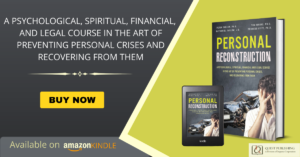by Rose Marie Quintos
When faced with a crisis, whether in business or in your personal life, it’s natural to feel a sense of fear and disappointment. You no doubt ask yourself: “What did I do wrong? How am I going to fix this?”
However, once the crash has passed or has been managed, there will be times when you will find yourself AGAIN in crisis, renewing the fear, disappointment, and diminishing your self-confidence.
There might also come a time when you are immobile due to missed opportunities and failures.
These instances emphasized the importance of “in-visioning.”
What is In-visioning?
The word In-visioning comes from the root word “vision,” which commonly relates to the words future, imagining, and seeing something. The Cambridge Dictionary defines “vision” as an idea or mental image of something, but what is the connection of this word to the personal crisis and crash in your life?
To help you assess the conditions of your life’s path, avoid accidents, and gather the tools needed for reconstruction when you do experience a crash, the authors posit through their book, Personal Reconstruction: A Psychological, Spiritual, Financial and Legal Course in the Art of Preventing Personal Crises, and Recovering From Them, their “in-visioning” concept.

Through in-visioning as we see ourselves from an outside perspective, to look into our lives and to develop those skill sets that will permit us to understand past mistakes and avoid future problems and crises.
…in-visioning is more than merely the sum of its parts; it is a methodology for knowing yourself,
seeing yourself in the ways that others see you, and helping yourself to
avoid life’s accidents or prevent crashes before they occur.
Personal Reconstruction by P. Tarlow, T. Marrs, N.Tarlow,, & E. Leite
In general, the art of in-visioning aims to teach you how to ask the right questions and identify the areas in your life that need changing or improvement. The goal of in-visioning is to help you understand yourself from four important perspectives — how others may see you, in the four areas of life: psychology, spirituality, finances, and the legal realm.
FOUR BASIC ASPECTS OF LIFE
1. Psychology
Based on the American Psychological Association (2019), Psychology is the scientific study of mind and behavior concerning the individual or group’s characteristics in relation to a particular field of knowledge or activity.
2. Spirituality
According to Dr. Maya Spencer (2012), spirituality involves the recognition of a feeling, sense, or belief that there is something greater than self, something more to being human than sensory experience, and that the greater whole of which humans are part is cosmic or divine in nature.
3. Finance
As stated by Adam Hayes (2022), finance is a term for matters concerning the management or creation of money and investments.
4. Law
Hugh Willis defined law as not only a scheme of social control but as science, the organized body of knowledge composed of principles, rules, and standards, that deals with the administration of justice.
The one thing that you do have control over is you. You have control over who you associate with, what circumstances you put yourself in, how vulnerable you make yourself, and how you react emotionally and psychologically to other people’s behaviors. The only thing you have control over is yourself.
The in-visioning approach teaches us to perceive ourselves from the outside in terms of the four basic aspects of life. We may not be able to control how others see us, or our crises, but you can help reconstruct yourself amid personal crises by allowing yourself to be understood from an outside perspective.
Learn more about in-visioning and the four basic aspects of life on the book Personal Reconstruction by P. Tarlow, T. Marrs, N.Tarlow,& E. Leite published by Quest Publishing.
Rose Marie Quintos is a Publishing Assistant and the Marketing Director for Quest Publishing,a division of the Inquesta Corporation. (She can be reached at rquintos@inquesta.com.)







